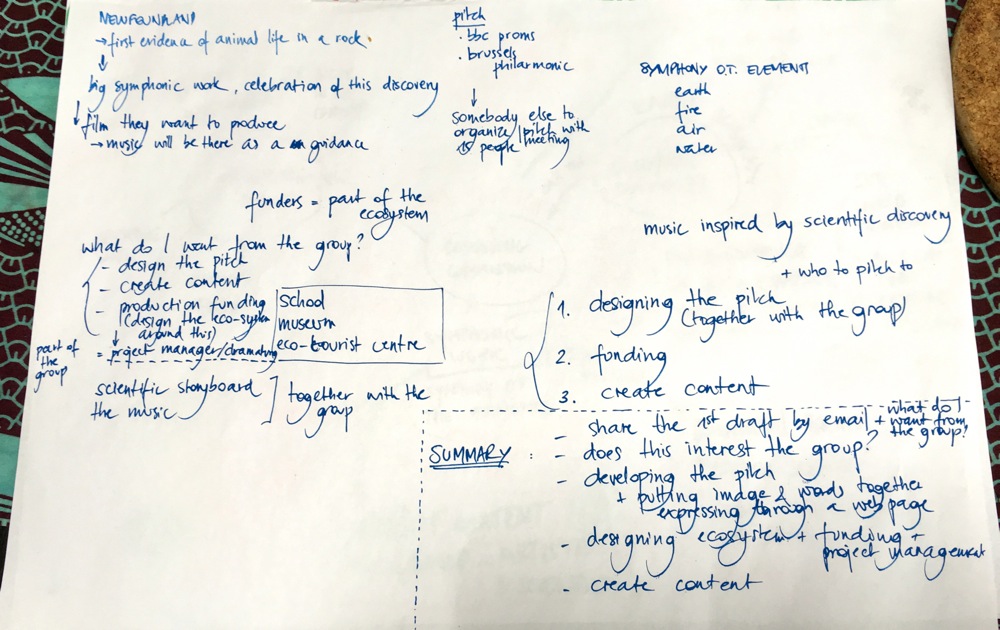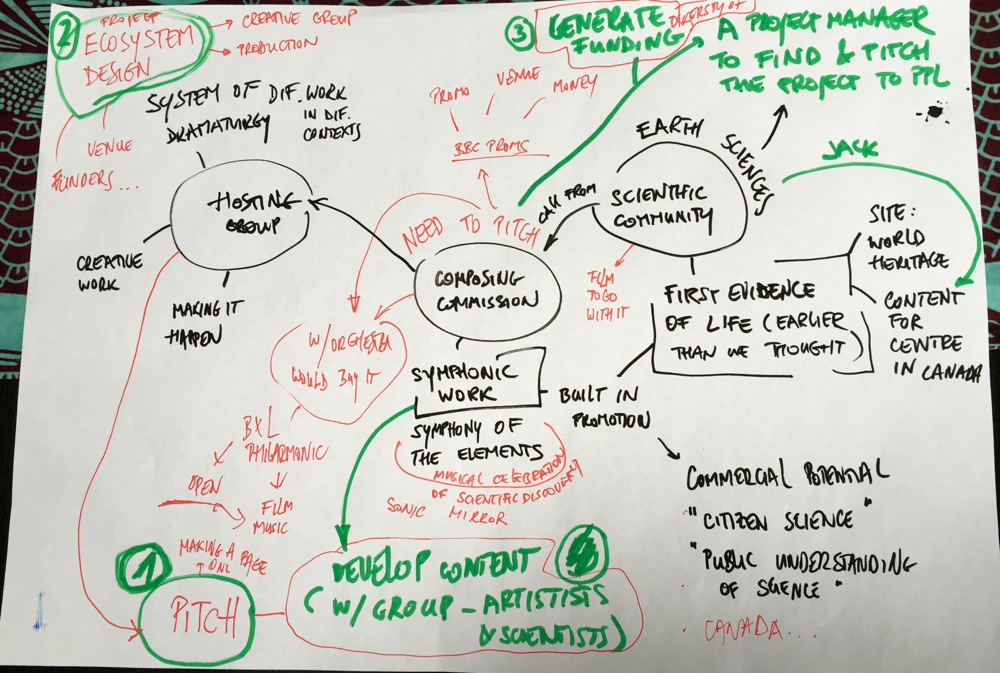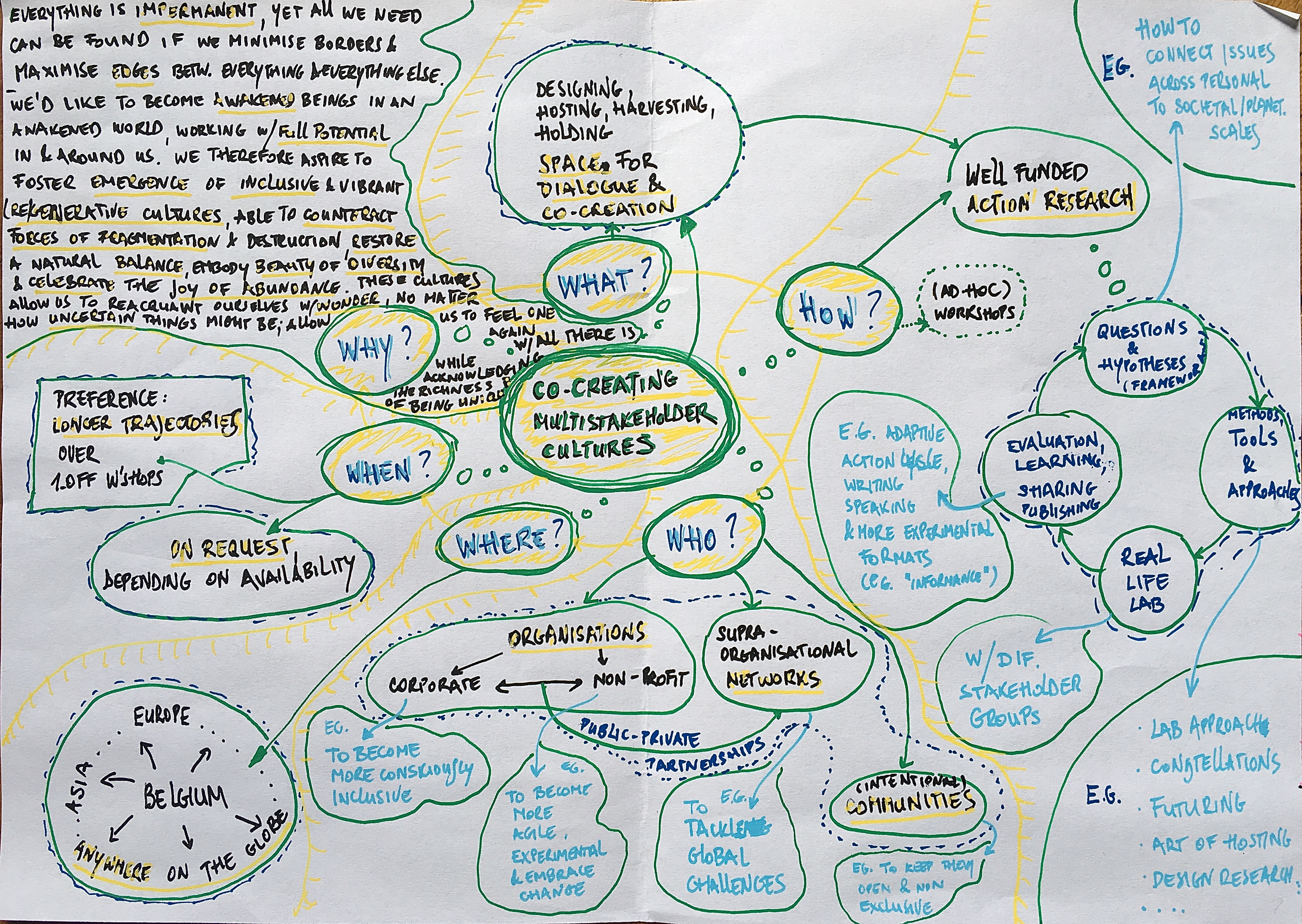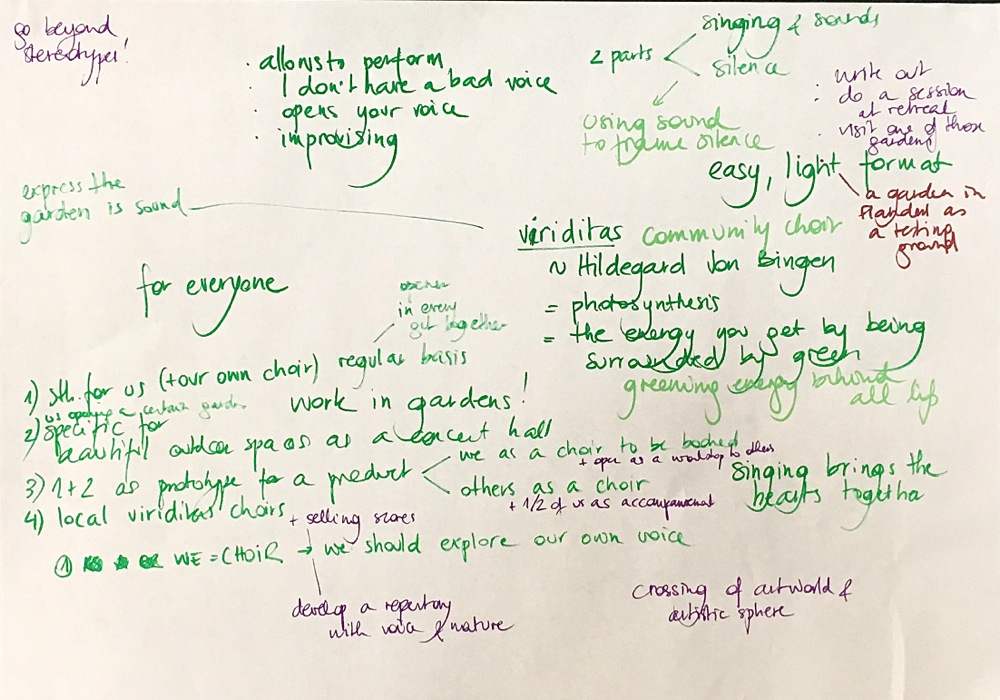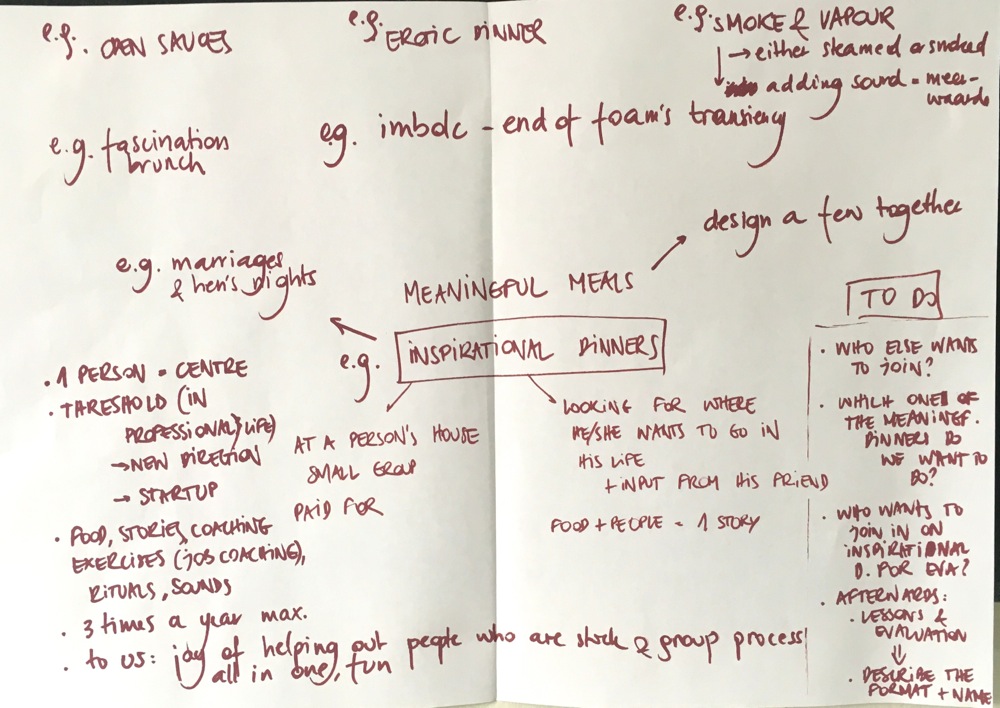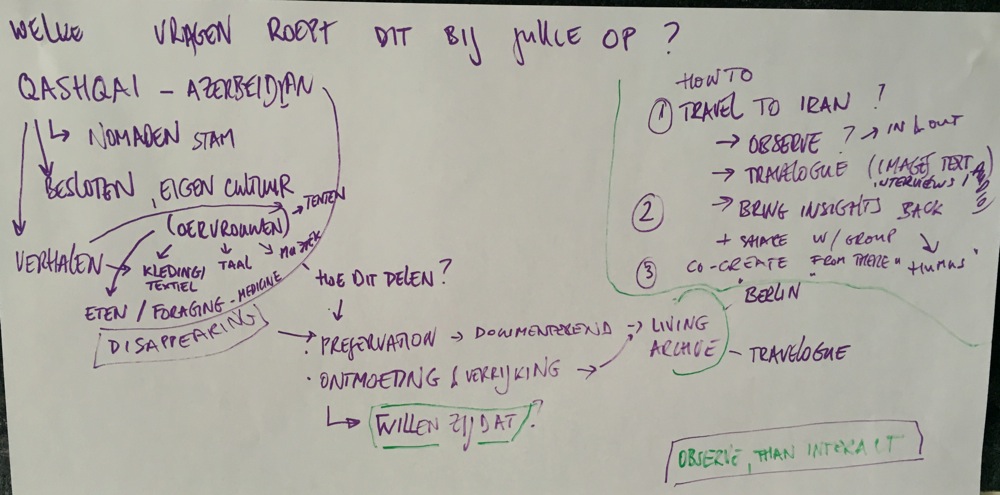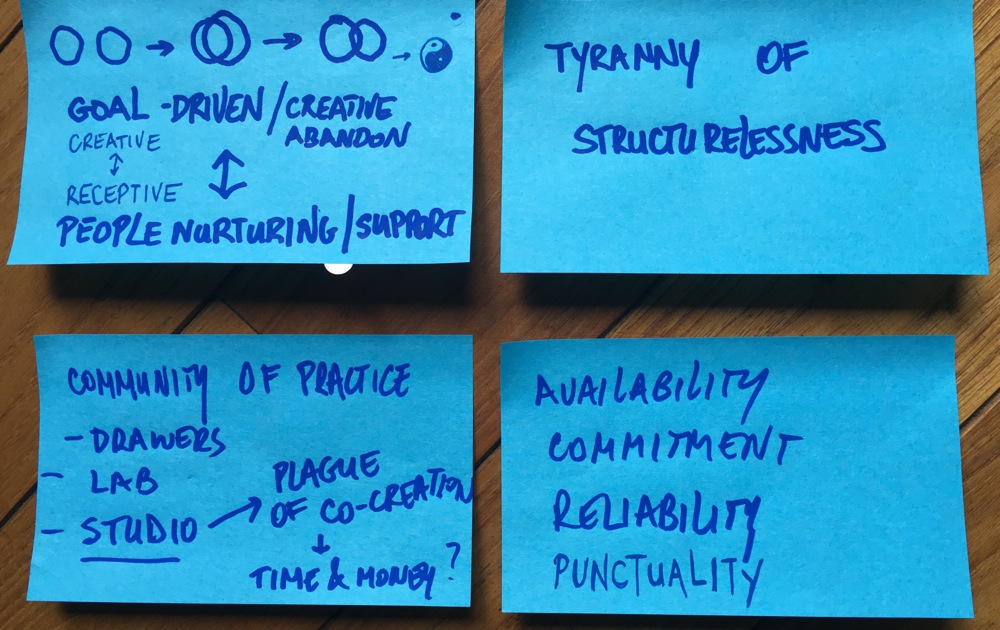Hosting community Open Space
7th July 2016 @ FoAM BXL
Core question: “How can we develop our practice?”
→ “Practice” could mean a specific activity, a working group, a thematic strand, a hosting experiment - anything that the community could co-create or support. Remind yourself of the activity mapping, as discussed in the previous gathering.
Flow: Open Space, on our blackboard, as a loose schedule
Framing: In this gathering, rather than talking about how the community could work - we are trying it out - in practice. Anyone who would like to discuss, test, or co-create an activity can host a session, lasting from 30-60 minutes. In Open Space anyone can become a host. If you'd like to host a session, you can design it as you like. It could be a conversation, exercise, test, mentoring, design, or anything else - the more different formats, the more refreshing the gathering will be. When proposing the session it can be useful to let the other participants know:
- what is the session about?
- what do you aim to get out of the session?
- what will be the format of the session)?
Resulting schedule for the day (with a check-in and warm up beforehand, and a check-out and meditation afterwards):

Re-treat
-Hosted by Eva DG
The re-Treat (16 to 18 September) is to be a treat to ourselves, in which we will be exploring our expertises through action and experiment, thus building a treasure chest to draw from for future retreats which we will offer externally. It is to be a hands-on activity; the meta-level reflection is to be kept for the evaluation session two weeks later. This evaluation will be sculpting the re-treat into a product to sell. The preparation of the re-treat will happen in an online open space (hosted by Lies), and will be collectively finalized on Friday night, at the start of the retreat. Eva DG and Kathleen are taking care of finding the (physical) space to make the retreat happen.
Charnia
-Hosted by Stevie
Stevie wishes to create a symphony of the elements, inspired by and as a celebration of the archeological/scientific discovery of the first evidence of animal life in a rock in Newfoundland. The symphony would ideally be performed by a symphonic orchestra (either BBC or Brussels Philarmonic) but it would also be recorded to accompany the documentary and for educational use in diverse eco tourist centres around the world.
→ What Stevie needs from the hosting group is 1. help to design the pitch, 2. co-creating the content for the symphony, 3. a project manager slash dramaturg.
→ The logical steps for Stevie/us are:
- Stevie shares a first draft of a pitch with us
- Are we interested as a group to contribute? If yes then:
- Help is needed to further develop the pitch (in words and images)
- Help is needed to create an 'eco system' around the project to aid finding funding and project management
- Let's create the content together!
Multistakeholders
A session to discuss how to frame our facilitation of participatory processes for multistakeholder groups and (systemic) transitions, where the hosting community functions as an action research lab for individual and collective experiments. The session consists of a presentation of a proposal as sketched out by Luea and Maja, a feedback round using the Six Thinking Hats cards and planning next steps.
-Hosted by Maja

From the discussion with Kathleen, we agreed that positioning of our work and community will be essential for success. There is quite a bit of competition, and locally in Belgium the market isn't too big. How we communicate will be key. We want to avoid too much art of hosting jargon, as it tends to put people off if they're not already an 'in-crowd' (especially in the sectors in which we often work). Another challenge is to keep the energetic balance between receptivity and action, to avoid the danger that many facilitators' communities face - too much complacency and inertia, ego-driven personal development without much collective 'movement' and impact.
It's crucial to combine and expand our networks across multiple sectors, aiming to reach new people with every process we host. Infiltrating higher education and training young people in hosting craft could be a way to keep the work and community fresh and evolving. Our community/working group should be an embodiment of a multistakeholder culture. Not only would we 'practice what we preach', but having a diversity of members would allow us access to wide networks partners, clients and participants.
We have to work on clarifying our goal: why, what, how? We are on the right track, but need to better clarify our unique identity. I we succeed, our work would be recognisable as having a unique hosting culture. Our work would be known and sought for in- and beyond Belgium, and we would see the 'ripples' of our influence in different organisations, sectors and communities.
Our intuition tells us that there is potential in this work, an interesting niche (hosting by combining approaches from the creative fields, business, science, etc.). To resolve the issues with “time and money” we have to build strong links between our individual work and what the community does, so that they re-enforce each other in positive feedback loops. Personal and professional development of each of the members will feed the development of the community itself.
Next steps:
- Until the end of August, Online: Draft a description of our work for internal and external purposes (“pitch document”), everyone interested can comment and edit online. Particularly focus on clarifying “why? what? and how?”
- End of August/beginning of September: Skype session to discuss the description
- Beginning of October: Finalise a pitch document in English and Dutch. Post and share online. Maja to take the document to Yong Global Leaders' Summit in Japan.
- Autumn (possibly November): Systems mapping for the process facilitation working group.
Viriditas choir
-Hosted by Stevie
Inspired by Hildegard von Bingen's neologism 'veriditas' we'd like to organize singing activities in gardens and out in nature, as an expression of a specific garden or other spot in nature into sound. Veriditas is the energy you get from being surrounded by green - the greening energy behind all life. Through sound and singing, we open up our surrounding green to an audience.
There are four formats which we want to develop:
- The hosting group choir: we come together on a regular basis to open up a certain garden/place by singing together
- We offer our singing as a choir to specific outdoor locations that serve as a beautiful concert hall. We can be booked to perform ourselves, but we can also broaden this up towards a workshop where the audience can participate as well.
- We are asked to help and accompany a specific group perform as a choir (e.g. a company team, a group of friends, a local choir …). This format could be described as a veriditas choir workshop.
- We could set up a local Veriditas choir on demand. We develop a 'book of scores' (a repertory for voice and nature) to offer them, which we could also sell online.
Singing brings the hearts together.
First steps:
- perform a session at our retreat
- visit the Oxford garden Stevie mentioned
- Find a garden in Flanders that can act as a testing ground
Meaningful Meals
- Hosted by Kathleen
We want to offer meals - breakfast, brunch, lunch, apero's, dinners - that are a delight to both stomach and soul. Inspiring, transforming, teasing, fascinating get togethers with delicious food. Some formats already exist and have been performed - e.g. Open Sauces, erotic dinner, Smoke & Vapour, … - while others are new ideas - inspirational dinners, fascination brunch, …
We elaborated on the inspirational dinners, which centres around one person who is on a threshold in his/her life and wants to be supported by his/her group of friends/family. The dinner consists of a combinatin of food and exercices.
First steps:
- Who wants to join?
- Which meaningful meals do we want to offer?
- A prototype of the Inspirational Dinner will be developed for Eva DG. Who wants to join this?
- Afterwards: lessons and evaluation of this prototype will be used to name and frame this specific meaningful meal.
Nomads Land
- Hosted by Lies
The session starts with summing up some elements (of opportunity): access to a vital nomad tribe in Iran (Qashqai people), whose lifestyle is nevertheless being replaced by a modern one; possibilities of an exchange of knowledge (in the domains of textile, medicine, cooking, music, autocratic life); preservation of traditional knowledge. These elements resonate with some of the key values of the hosting craft community, especially with the notions of rewilding, craft and hosting itself. They might entail different possible formats. The host proposes participative nomadic co-traveling with experts in the different domains described above. The session points to the permaculture principle of 'first observe, then interact'. It is concluded that the host will make a journey to and with the tribe (February-March 2017). Her observations will be documented in writings, audio recordings and photography and will be presented to the hosting craft community in the form of a lecture in September 2017.
Conundrums
This session is meant to bring a few conundrums out in the open, without attempting to resolve them. Just let them linger in the back of our heads in the months to come… We began by bringing up a few of my pain points, using Vajrakīla, the ritual dagger “… to bind and pin down negative energies or obscurations from the mindstream of an entity, person or thoughtform, including the thoughtform generated by a group, project and so on, to administer purification.” During and after the session these pain points were transformed into open questions. At the end of the day Stevie and I improvised a guided reflection for voice and hurdy-gurdy (see below), on how to transform insights from difficult situations into deeper aspirations and appreciation of life.
-Maja
How do we transform problems into creative challenges?
For example:
- How can we, in this community, find a good flow between creative and receptive energies, between collective, goal-driven activities and supporting/nurturing individual members (think of the flow in the yin-yang symbol)?
- How can we co-create a light and clear community structure to avoid the “tyranny of structurelessness” (see quote below), allowing the group to become agile and adaptive?
- How do we balance the drive to hang out together and co-create new activities with the “time & money” pressure the individual members are struggling with?
- How can we be available, committed, reliable and punctual, so that we can enjoy “being and doing” together? So that the logistics and co-ordination tasks can be evenly and effectively distributed and exchanged, while also having time to socialise, celebrate and relax, i.e. enjoy each others' company?
Unstructured groups may be very effective in getting women to talk about their lives; they aren't very good for getting things done. It is when people get tired of “just talking” and want to do something more that the groups flounder, unless they change the nature of their operation. Occasionally, the developed informal structure of the group coincides with an available need that the group can fill in such a way as to give the appearance that an Unstructured group “works.” That is, the group has fortuitously developed precisely the kind of structure best suited for engaging in a particular project. While working in this kind of group is a very heady experience, it is also rare and very hard to replicate. (…) Once the movement no longer clings tenaciously to the ideology of “structurelessness,” it is free to develop those forms of organization best suited to its healthy functioning. (…) Mostly, we will have to experiment with different kinds of structuring and develop a variety of techniques to use for different situations. (…) But before we can proceed to experiment intelligently, we must accept the idea that there is nothing inherently bad about structure itself – only its excess use. Tyranny of structurelessness by Jo Freeman
Guided meditation
Think of a difficult situation that has you in its grip. Inhabit it, surround yourself in it as if you were in a movie. Look at yourself. What does your distress feel like? In your thoughts, emotions, in your body… What’s underneath this feeling? Is there a deeper wound, a vulnerability, a suffering, an unfulfilled yearning? Stay in this yearning for a while. See it, experience it as it is right at this moment. Offer it what it needs… As Thich Nhat Hahn says: “Darling, I see your suffering…” Begin turning outwards… Look at the difficult situation again, and you in it. What does this situation want to teach you? What can you take from it on your life's path? Let's look at this path for a while… Your life… What if you had only a year to live? A month? A day? An hour? Just a few moments? What would really matter? Slowly come back to the here-and-now. Look around you. Remind yourself how precious it is to be alive, no matter if it's for a few moments or many decades… How does it feel to be grateful for being alive? Let everything else fade into the background, as sound gradually fades into silence…

